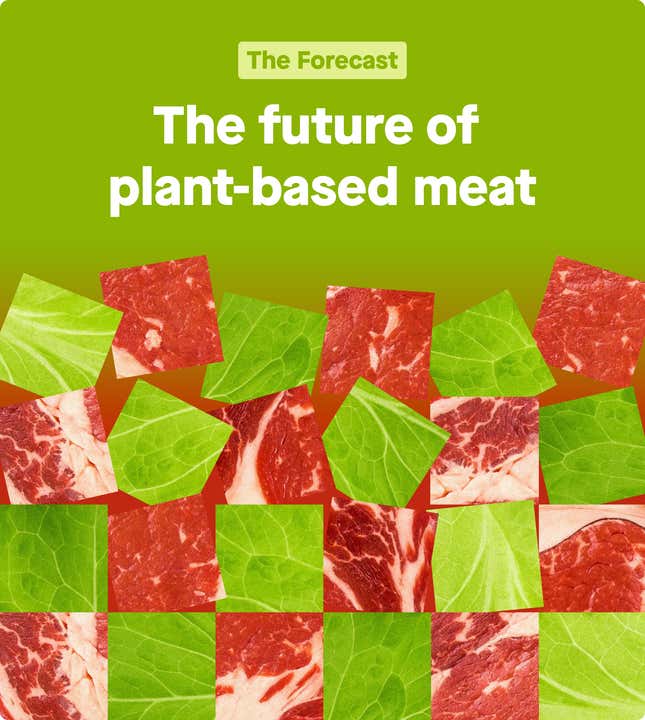
Hi Quartz Members,
It’s a great time to be a vegetarian. Walk into any supermarket in America and you’ll likely find shelves full of plant-based meat products such as burgers, sausage, and even “chicken” nuggets. And if you’re too lazy to cook today, no problem. Major fast-food chains such as Dunkin’ Donuts, McDonald’s, and Chipotle offer meals built around plant-based meat. The best part is, most of it tastes pretty dang good.
Appealing to omnivores and vegetarians alike, plant-based meat has found its place on the American menu, but whether it will ever become a main course remains an open question. While it enjoyed explosive growth in its first few years, sales plateaued in 2021 and are now growing slowly. For some, the novelty factor may be wearing off. Diners were blown away by their first bite of an Impossible Burger—browned to a crisp and oozing pink inside, with an uncannily meaty tang you wouldn’t expect from soy protein, coconut oil, and plant-derived flavors—but when its novelty faded, it was just a burger, with a higher price point and similar calorie count as its traditional meat counterpart.
When Americans find themselves in the refrigerated food aisle weighing a pound of ground beef against a packet of plant-based meat that costs twice as much, which will they realistically take to the check-out line?
Backstory
Though veggie-based meat alternatives have been around for decades (Quorn or Boca Burgers, anyone?), plant-based meat—which uniquely mimics the taste and texture of animal protein—burst onto the scene in 2019. That was, according to food media, “the year of the plant-based burger”—the Impossible Whopper made its Burger King debut, and Beyond Meat had the year’s most successful IPO. Between 2019 and 2020, sales of plant-based meat grew 45%, hitting $1.2 billion. Before long, plant-based burgers, tacos, and fried chicken were being sold across America’s favorite fast-food chains (and, little by little, at some of their locations in Europe and Asia, too). Americans, especially affluent and educated millennials and Gen Z, gobbled it up.
During the first few months of the pandemic, sales continued to grow, buoyed in part by frantic pantry-stocking. But into the second year of covid-19, they started to flag, hitting a plateau in late 2021 that continues today. In 2021, plant-based meat made up just over 1% of US meat sales. Some industry professionals see slowing sales as a sign that plant-based meat is destined to become a niche product, like organic and grass-fed meat, rather than a mainstream one.

Pros/Cons
➕ Since its inception, plant-based meat has been marketed as a sustainable alternative to meat from animals, which is widely understood to be a major climate offender, owing to the copious carbon emissions, deforestation, and water use associated with raising livestock or poultry. Critics have tried to poke holes in the plant-based industry’s green claims, but it’s generally accepted that, yes, plant-based meat is better for the environment than animal meat. It’s less ethically fraught, too, as animals aren’t harmed in the process.
➕ Some have argued that it has the potential to alleviate food insecurity because it will be able to satisfy consumer demand for meat as climate change makes industrial-scale animal farming increasingly difficult and precarious.
➖ The cost of plant-based meat, which is roughly double that of conventional ground beef, remains prohibitively expensive for some consumers. Private and public investment is needed to help the industry scale and shift away from its current high-margin, low-volume model.
➖ There are concerns about the large amounts of calories, saturated fat, and sodium in plant-based meat. (Part of the concern stems from the expectation that plant-based foods are designed to be healthy, when the goal is merely to replace meat.)
➖ While the US loves burgers and nuggets, the limited offerings currently available in large supermarkets and restaurants could soon start to get old.
The Players
- Impossible Foods and Beyond Meat: Now household names, these brands are among the top 10 best sellers in this category. Recently, they’ve slashed prices in an effort to match the cost of meat.
- Omnipork: Created by Hong Kong-based Green Monday, this company specializes in plant-based pork, with products including ground meat, pork strips, and luncheon meat (a.k.a. vegan SPAM). After taking Asia by storm, it made its US debut in Sprouts, a health-focused grocery chain, and a handful of Whole Foods locations in 2021. Omnipork has recently started offering seafood products like fish filets and crab cakes.
- Gardein: Owned by Canada’s Conagra, Gardein is another top company in this space, best known for its plant-based meatballs and frozen meals. It recently expanded into imitation chicken products with a line of breaded “Chick’n” tenders, nuggets, and filets.
- Good Catch: A competitor in the nascent plant-based seafood space, Good Catch, owned by Gathered Foods, makes fish sticks, filets, and burgers, together with crab cakes and fish cakes. In 2021, Good Catch launched menu items with the fast-food chain Long John Silver’s and expanded into Sprouts stores nationwide.
🔮 Predictions
For now, plant-based meat has been most successful by staying close to its animal-based corollary. “It’s notable that plant-based meat growth is dominated by products that are analogous with conventional meat products that closely match the taste, texture, and appearance of conventional meat,” says Emma Ignaszewski, corporate engagement project manager of the Good Food Institute, a nonprofit advocating for alternative meat and protein. “To win over consumers, plant-based meat products have to taste delicious.”
The future is going to get weirder, with:
- More meat types, especially poultry. This year, says Ignaszewski, there’s been a “flurry of plant-based chicken launches” hitting retail shelves. The industry is also looking to expand plant-based seafood, which currently makes up just 1% of the plant-based meat market.
- More varied pre-made products. As technology improves, consumers can expect “whole cuts,” from “steak to bacon to sushi-grade salmon that can be the star of the dinner plate,” Ignaszewski says. One startup, called Black Seed Foods, is even developing plant-based lamb, wild game, and heritage meats.
- More natural ingredients. To address consumer concerns about ingredient lists “sounding chemical,” brands will likely roll out “cleaner” recipes. Already, Maple Leaf Foods-owned Lightlife has cut out animal-based products like eggs and synthetic substances such as maltodextrin and carrageenan from its products, and a startup called Sundial Foods boasts a plant-based chicken wing that has only eight ingredients.
- More new companies. Though legacy food producers like Kellogg’s (owner of MorningStar Farms) and Tyson (which recently launched Raised and Rooted) are stepping into the plant-based meat industry, Ignaszewski expects that there will be plenty of room for startups in this space. Just look at the mix of startups and incumbents producing plant-based milk, which now makes up 15% of all milk sold in the US, she says.
Sound off
Will plant-based meat ever replace traditional meat in the American diet?
Yes, bring on the plant-based filet mignon
No, I’ve got beef with that notion
Can’t we enjoy veggies for what they are?
In last week’s poll about at-home fitness, 43% of respondents said they’d rather work out on their own, without an instructor. Looks like we’ll all be working out at home for a while longer yet.
Have a great week,
—Yasmin Tayag, contributor (ask me about my killer Impossible longanisa recipe)
One 🌱 thing
Though plant-based meat increasingly looks, feels, and tastes like the real thing, some predict that consumers will eventually tire of meat mimicry and the processing that comes along with it. What comes after plant-based meat may simply be going back to eating plants. Why eat a plant-based burger when you could have a delicious mushroom steak?
